history
British Army veterans commemorate the Berlin Blockade anniversary
On the 70th anniversary of the lifting of the Berlin Blockade, the Royal British Legion held an event at the Imperial War Museum Duxford to commemorate those who participated in the Berlin Airlift. Berenice Baker talked to British Army veterans about their experiences.

A US Air Force C-54 Skymaster dropping candy during the Berlin Airlift, 1949. Image: US Air Force
The Berlin Blockade, which ran from 24 June 1948 to 12 May 1949, saw the Soviet Union obstruct all land and water access to Berlin, triggering one of the first major international crises of the Cold War. The US and UK responded by airlifting food and fuel through just three permissible air corridors to civilians in Berlin from Allied airbases in western Germany.
Berlin was situated in the middle of the Soviet-occupied area of Germany and was itself divided into four sectors: French, British, American and Soviet. While Royal Air Force (RAF) and US Air Force (USAF) personnel operated from airbases outside Berlin, ground troops were stationed in the city as a peacekeeping occupying force as part of the joint administration effort.
We spoke to two British Army veterans about their experience, and take a look at some of the aircraft used during the Berlin Airlift and their modern-day equivalents.
Colin Cottle, Royal Corps of Signals: providing airfield telephone support
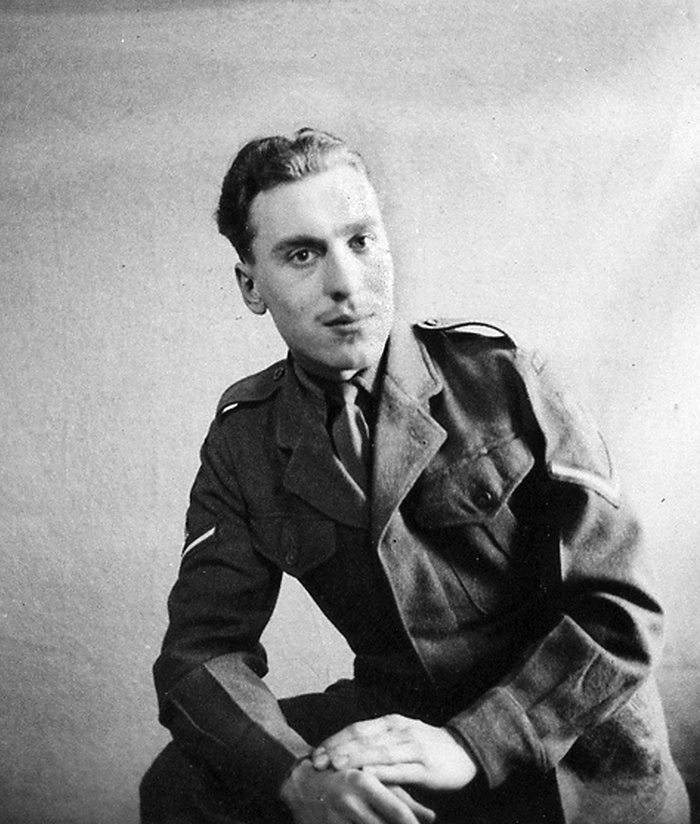
I said to my girlfriend at the time, Josephine, who’s now my wife, I want to join the army as a regular because if you go as a regular you can choose your career. If you went in as a national serviceman they told you what you were going to do. I wanted to actually get a career and learn something that I could earn a living with when I got back to civilian life.
I went to Catterick, which is the base for the Royal Signals, in August 1948 and did my basic training, and then we were shipped out to Germany. Initially, I wanted to be a radio mechanic because I had an interest in that kind of thing. But when I got to Catterick, I then decided that I wanted to be a vehicle mechanic.
But when I got to Germany I found I was part of the airlift. When I got to Fassberg, I didn’t know very much about the airlift. I was there with the Royal Corps of Signals; at the time the army always gave telephone support to the RAF. Each day we went out repairing telephone line faults, and in those days they had these things called teleprinters which were electronic typewriters, and when you typed things out it went down the phone lines and operated another teleprinter at the other end.
One day they said to us the Americans are going to take over this airbase because the American zone is a lot further from Berlin, and if they come on to this base they can get two trips a day into Berlin where they can only do one.
The Americans were reshipping mainly coal into Berlin. They had these big four-engine aircraft called Skymasters and they had to carry quite a big load. The RAF were originally operating Dakotas at Fassberg, but they were all moved out to another airfield.
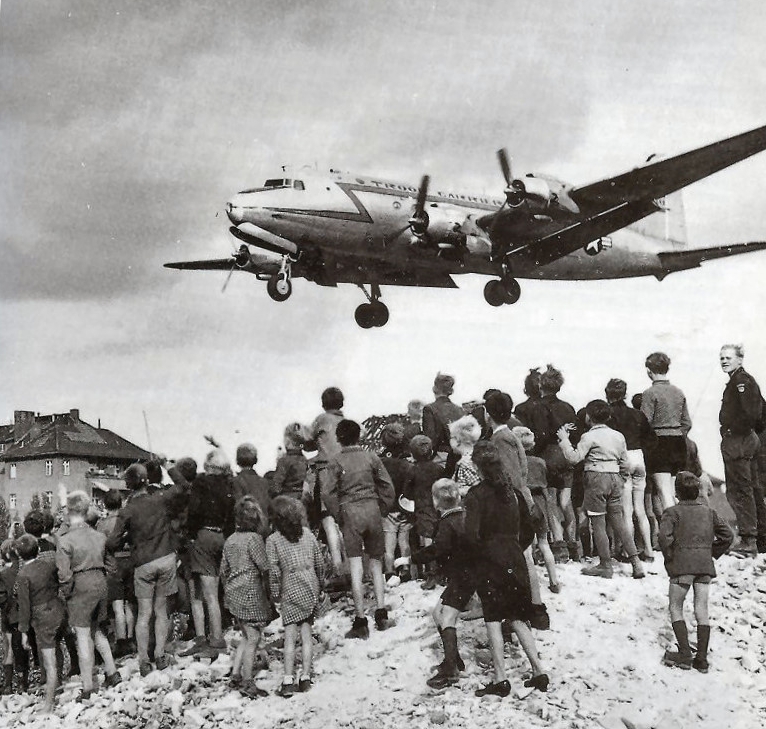
C-54 Skymaster brings supplies into Berlin, 1948. Image: Henry Ries / USAF
The Americans came in and said to us from next week we’re closing the RAF mess house and you’ll all be messing with the Americans. After all those war years of rationing, there was so much food it was unbelievable!
When the Russians removed the blockade, the British and Americans didn’t really trust them because we thought the Russians were getting us to wind down the operation and get rid of all the aircraft and then they would put it back on again. It was decided to keep the aircraft flying, just to prove to the Russians that we weren’t going to be fooled by something like that. It carried on for a few months after the Russians removed the blockade.
When the airlift finished, I stayed on in Germany and went back to normal duties until I came back in August 1953.
john Healey, Queen’s Royal Regiment (West Sussex): occupying forces
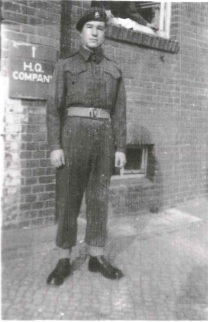
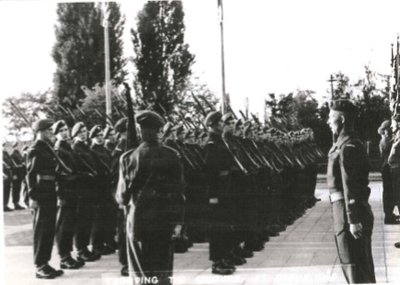
I was conscripted in March 1948 to the Royal West Kent Regiment in Shorncliffe and completed eight weeks of basic training. After embarkation leave, I was transferred to 2 Battalion, Queen’s Royal Regiment (West Sussex).
At the end of June or beginning of July, I embarked for Berlin, stopping over near Hannover for a few days before flying to Berlin by Dakota aircraft from Buckeburg airfield. There weren’t seats on the Dakota; we just sat along the side. I’ve no idea where they put our kit but it was there when we arrived.
We were billeted in the Olympic Stadium, which was built for the 1936 Olympics, under the first floor stands. The Royal Scots Fusiliers rear-guard were still in occupation when we arrived. We could use the Olympic pool and held Trooping of the Colour on the parade ground outside.
In around April 1949, I flew with an officer of the regiment to Paderborn in the British zone for war exercises, which lasted three weeks. On arrival, my services weren’t required so I just stayed there until the exercise finished and made my own way back to Berlin by air and the aid of Movement Control. The plane was a few days late so I was charged for returning late to the regiment. These charges were always dismissed because of the uncertainty of available flights.
The blockade ended in May 1949, and in November “A” Company was sent on detachment to Tiergarten. This was an immediate response unit and we stayed there for a month then moved to Iserlohn near Dusseldorf. I left Iserlohn on 11 January 1950 and was discharged on 13 January at Aldershot.
The Berlin Airlift aircraft
How do some of the aircraft used in the Berlin Airlift compare with their modern equivalents?
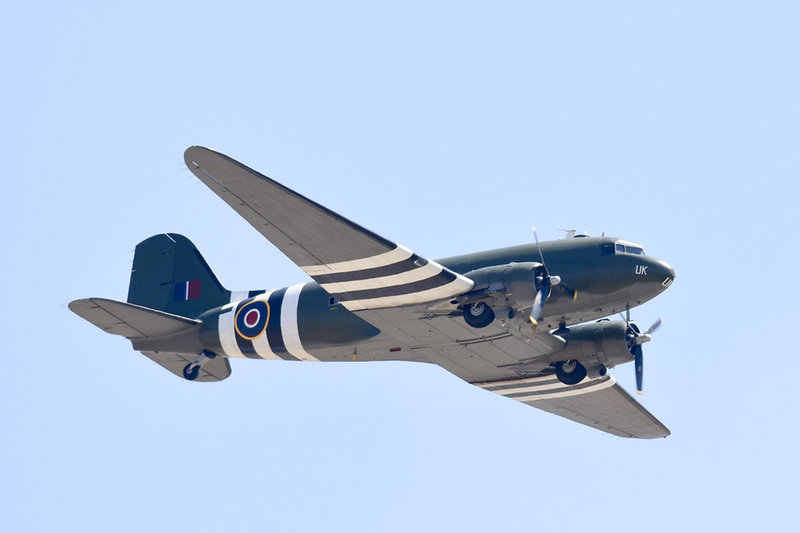
RAF Dakota at the Royal International Air Tattoo 2018 Battle of Britain Memorial Flight. Image: Dave_S via Flickr
RAF aircraft used in the Berlin Airlift: Douglas Dakota
The US-made Douglas C-47 Skytrain was designated the Dakota by the RAF. The Dakota had a crew of four and a maximum payload of nearly 6,000kg of cargo, depending on the model. It measured 19.4m long and had a wingspan of 29.11m.
Modern equivalent: Airbus A400M Atlas
Introduced in 2013, the Atlas has a crew of three or four and can carry 116 fully-equipped troops or paratroopers or 37,000kg of cargo. It is 45.1m long and has a wingspan of 42.4m.
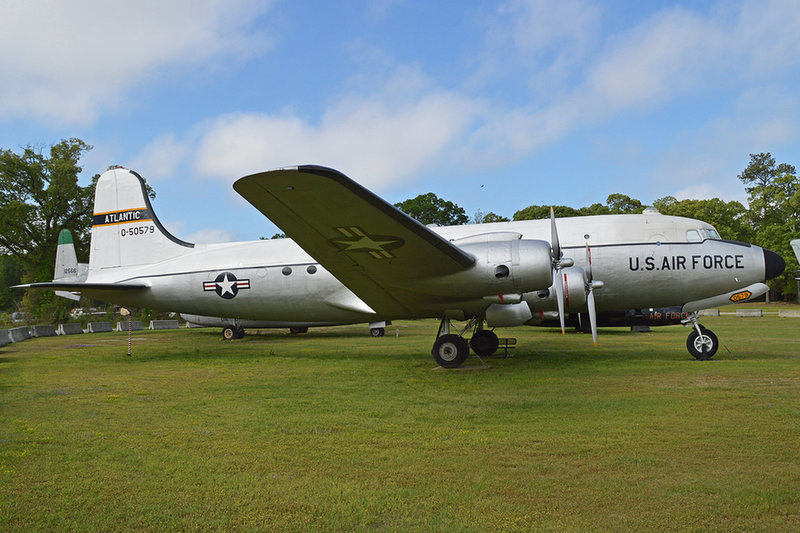
Douglas C-54G Skymaster. Image: Alan Wilson via Flickr
USAF aircraft used in the Berlin Airlift: Douglas C-54 Skymaster
Another Douglas Aircraft Company military transport aircraft, the larger Skymaster also had a crew of four and could carry 50 troops or 14,700kg of cargo. It was 28.6m long and had a 35.81m wingspan.
Modern equivalent: Boeing C-17 Globemaster III
Introduced in 1995 and in production until 2015, the Globemaster has a crew of three and can carry up to 134 passengers depending on the model. With a length of 53m and a wingspan of 51.75m, its payload capacity is up to 77,520kg of cargo and it can even carry an M1 Abrams Tank.